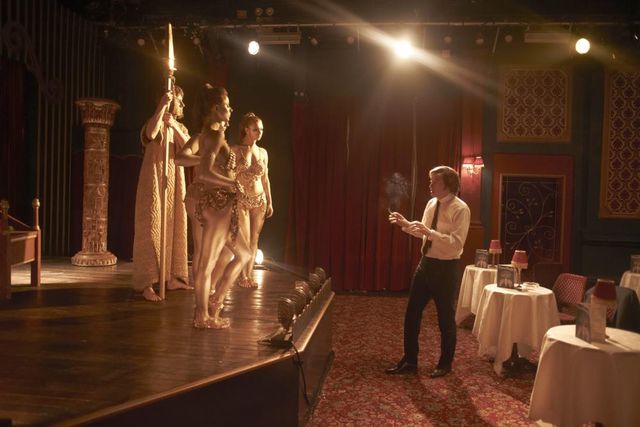Star Trek rolled up in 2009, a year without a serious Marvel movie (the useless X-Men Origins: Wolverine does not count), so the chance to directly compare two current juggernauts in the same space didn’t come up. Now it has, with results not so much striking as… well, what is that sensation? Relief, perhaps, that for all the multiple TV-derived weaknesses of this crop of writers and JJ Abrams’s odd faith in Simon Pegg, someone with a grasp of the Spielberg section of the manual is prepared to put up not shut up. Abrams doesn’t have his inspiration’s touch for actors at rest who aren’t really resting, but he shares the feel for how the technological sublime works, and the inclination to use colour and sight-lines to guide a viewer onto tracks rather than pummel them in the face until they opt for loving submission.
For the most part Star Trek Into Darkness spins along, shoved jointly by Dan Mindel’s cinematography and Michael Giacchino’s score. The look of the thing is even more rigidly controlled than last time; all those supposed excesses and pointless lens flares and scintillating surfaces plainly working as the tight Soderbergh-ian motivational tactics they always were. While you’re chewing on that lot, Giacchino gives Benedict Cumberbatch a more versatile villain theme than the guy in the last film got, and earns his wage almost immediately with a track that nearly builds some Nyman-esque piano motion. Both departments are so innately cinematic, rather than just run-of-the-mill dramatic, that I’m sticking with my theory: the JJ Abrams trick is a grafting of tv onto cinema, unlike Joss Whedon’s instinct to try and make the converse procedure fly. Abrams’s ability to use the fences to his advantage rather than smack into them is almost radical, compared to Marvelution’s current stiff template and conservative restraint. (Marvelution’s previous incarnations are a different matter, especially Bryan Singer’s semi-detached contributions; ten years on, X2 remains better than any Star Trek.)
Savvy enough to make the Federation’s war room look like Dr Strangelove‘s while they cook up a remote drone-attack battle plan, Into Darkness is also a late reminder that Star Trek was never knowingly apolitical. The film is many miles from flawless: Alice Eve looks a bit embarrassed; Cumberbatch is the Bad Brit from a template even older than Marvel’s; and the modern theory that momentum can take the place of story rather than serve it is in the end a terrible error. But hiring a director who can do pastiche properly now looks an even smarter move than it did four years ago. It gifts New Trek with a natural glance backwards at its roots even while it roars forwards into some drastically well-lighted future; Marvel’s more ambivalent attitude to its own past would short-circuit that kind of maneuver even if they showed much sign of being interested. Abrams will be lucky to get away with this approach many more times, and some new iteration of the counter-culture Feds will be along tomorrow to throw the manual away. But today, this one will do.
 The Look of Love, I'm So Excited, Iron Man Three reviews
The Purge, Byzantium
Coverage of this year’s Edinburgh Film Festival should be along shortly. A preview of the festival was commissioned by a commercial website and
The Look of Love, I'm So Excited, Iron Man Three reviews
The Purge, Byzantium
Coverage of this year’s Edinburgh Film Festival should be along shortly. A preview of the festival was commissioned by a commercial website and